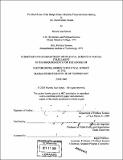| dc.contributor.advisor | Harvey M. Sapolsky. | en_US |
| dc.contributor.author | Simon, Marsha Jean | en_US |
| dc.contributor.other | Massachusetts Institute of Technology. Dept. of Political Science. | en_US |
| dc.coverage.spatial | n-us--- | en_US |
| dc.date.accessioned | 2006-07-31T15:26:04Z | |
| dc.date.available | 2006-07-31T15:26:04Z | |
| dc.date.copyright | 2005 | en_US |
| dc.date.issued | 2005 | en_US |
| dc.identifier.uri | http://hdl.handle.net/1721.1/33708 | |
| dc.description | Thesis (Ph. D.)--Massachusetts Institute of Technology, Dept. of Political Science, 2005. | en_US |
| dc.description | Includes bibliographical references (leaves 121-127). | en_US |
| dc.description.abstract | This study examines the consequences of the Gramm-Rudman super-majority budget rules on fiscal decision making in the Senate. It attempts to determine the efficacy of these rules as defined by those who advocate them, Public Choice scholars and conservative activists, by testing both whether they restrain spending overall and, second, whether they more often block spending benefiting concentrated special interests than other types of spending. The study concludes that super-majority budget rules do not restrain spending, much less spending on special interest legislation. The Gramm-Rudman rules were not responsible for the budget surplus that emerged in the late 1990s, and public choice scholars have no credible explanation for the surplus. Further, I argue that these rules have had the unintended effect of strengthening the hand of the leadership of the committees responsible for spending and tax legislation and diminished the ability of other Senators to influence money bills. These rules have compounded the anti-democratic bias of the Senate, increased hold-out costs, and generally made the legislative process less transparent and understandable to the public and even to the Senators themselves. | en_US |
| dc.description.statementofresponsibility | by Marsha Jean Simon. | en_US |
| dc.format.extent | 183 leaves | en_US |
| dc.format.extent | 10700861 bytes | |
| dc.format.extent | 10708607 bytes | |
| dc.format.mimetype | application/pdf | |
| dc.format.mimetype | application/pdf | |
| dc.language.iso | eng | en_US |
| dc.publisher | Massachusetts Institute of Technology | en_US |
| dc.rights | M.I.T. theses are protected by copyright. They may be viewed from this source for any purpose, but reproduction or distribution in any format is prohibited without written permission. See provided URL for inquiries about permission. | en_US |
| dc.rights.uri | http://dspace.mit.edu/handle/1721.1/7582 | |
| dc.subject | Political Science. | en_US |
| dc.title | The real rules of the budget game : minority fiscal decision making in the United States Senate | en_US |
| dc.type | Thesis | en_US |
| dc.description.degree | Ph.D. | en_US |
| dc.contributor.department | Massachusetts Institute of Technology. Department of Political Science | |
| dc.identifier.oclc | 64696453 | en_US |
